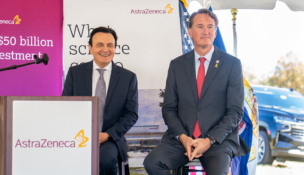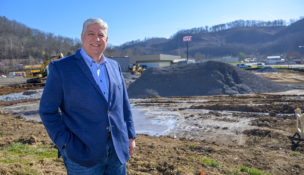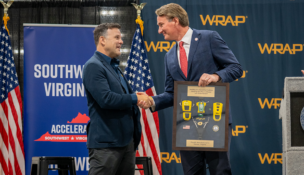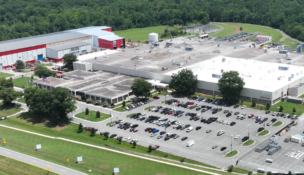The mouse that roars
Arlington aims to become new and improved Silicon Valley
The mouse that roars
Arlington aims to become new and improved Silicon Valley
Arlington County encompasses an area of just 26 square miles, making it geographically the smallest self-governing county in America.
But in many ways, it is the mouse that roars.
In November 2018, Arlington snagged the biggest economic prize in Virginia — and possibly U.S. — history when Amazon.com Inc. announced it would build its $2.5 billion East Coast headquarters, HQ2, in what is now known as the National Landing area of Arlington, with plans to hire 25,000-plus employees over the next decade or so at an average annual salary of $150,000.
But landing Amazon was not a slam dunk.
More than 200 cities nationwide vied to win the tech giant. And, another planned headquarters expansion in New York was derailed as a result of local opposition.
As the chosen one, the eyes of the business world have been on Arlington ever since, with expectations that Amazon will drive even more economic growth in the county and the region.
Telly Tucker, Arlington’s director of economic development, says that a lot of the county’s economic prospects following Amazon’s HQ2 announcement “are in the tech sector, especially those that employ the same types of talent as Amazon.” He declines to elaborate on which companies are looking at locating in Arlington.
“We’re not going to give away our secrets,” Tucker says with a laugh.
However, he adds, “talent continues to be the greatest asset for most of these companies and this region. Fortunately, we are known for having a rich supply of highly qualified talent in the tech space.”
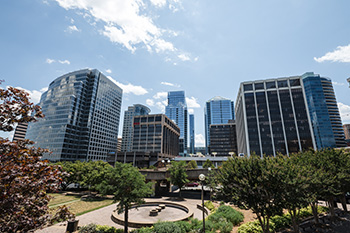
Arlington is one of the nation’s most highly educated localities: 74% of residents hold a bachelor’s degree or higher, and 39% of all adults have a graduate or professional degree.
Moreover, nearly a quarter of the population is in the highly desirable working age bracket of 25 to 34. It’s the highest concentration of young workers in that age category in the nation, according to the county.
Arlington was already doing pretty well before Amazon came along, positioned as the fifth-richest county in the U.S., with a median family income of $112,238, according to the most recent Census data.
This year Arlington and its 235,000 residents — the population tops more than 300,000 during workdays — are celebrating the 100th anniversary of its naming.
But celebratory events have been put aside for the time being.
A commitment to equity
Like most of the nation, Arlington is trying to claw its way out of the economic downturn and widespread illness brought on by the coronavirus pandemic.
In years past, the county has consistently topped all other Virginia localities for domestic tourism spending, but its hotel occupancy and revenues have suffered due to pandemic shutdowns and people sheltering at home.
Libby Garvey, chair of the Arlington County Board of Supervisors, laid out the impact on the tourism industry in recent remarks to the local chamber of commerce.
“April’s hotel occupancy and revenue were down around 90% compared to last year,” Garvey says.
“The pandemic has resulted in layoffs or furloughs for many of the 27,000 hard-working people employed in Arlington’s hotels, restaurants and businesses. Many of them are turning to Arlington County for help with food and rent.”
The drop in tourism has meant that Amazon won’t receive the first of 15 planned incentive payments from the county because the payments are funded from a 15% share of the county’s lodging tax.
Garvey also emphasizes what might now be regarded as a prescient decision made well before this summer’s Black Lives Matter protests — Arlington’s commitment to racial, gender and socioeconomic equity.
The Board of Supervisors passed a September 2019 resolution pledging support for equity and recognizing that some county residents are likely to experience poorer outcomes and other disparities. These include people of color, women, people living in poverty, immigrants and refugees, LGBTQ+ community members and people with disabilities, in addition to residents living in certain neighborhoods.
“We need to change a paradigm,” Garvey says. “The paradigm is that the most vulnerable in a society are the first to suffer from change and the last to gain from it — if they ever gain at all. Economic change tends not to be equitable. That’s the old paradigm. We want a new one.”
A vocal advocate of the county’s goals to achieve equity, she positions the county’s pledge not only as a humanitarian issue but an economic one.
“As a nation, we’re starting to realize that the most vulnerable workers among us are also our most essential workers,” she says. “We depend on them for our food. We depend on them for our health care services, for our personal services, for our child care. Frankly, we can’t function without our most vulnerable workers. And if they get sick, we get sick.”
Tucker, who became Arlington’s economic development director in January 2020 after moving from Danville, says the county’s commitment to racial equity was one of the reasons he, as an African American male, applied for the job.
He says the county’s commitment is summed up in an acronym — RACE — which stands for Realizing Arlington’s Commitment to Equity.
RACE challenges the county’s various departments and employees to ask four questions as part of every decision that’s made and every program and new policy that’s implemented: Who benefits? Who’s burdened? Who’s missing? And how do we know?
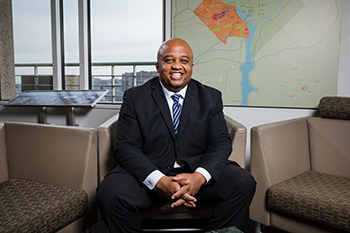
Tucker says Arlington’s commitment to equity resonates far beyond an acronym, however, and plays well in the economic development community.
“What we’ve learned and continue to hear from our prospective companies and existing companies, particularly in the tech sector, is many of these companies are much more social conscious than they’ve ever been,” Tucker says.
“They recognize how visible they are globally. They are conscious about equity and diversity. For many of them, particularly in the millennial generation, it’s a point of emphasis for them to be active and engaged in a community, beyond what they do 8 to 5.”
“The diversity of our community is an asset,” adds Kate Bates, president & CEO of the Arlington Chamber of Commerce. “We like to think of Arlington as a place where everyone can be accepted.”
Top dog in the making
Bates says that Arlington was known for decades as a “government town,” because of its proximity to Washington and because the Pentagon is a top employer. But Amazon is helping to diversify the county’s economy, she says.
However, Arlington was on “an exciting trajectory even before Amazon came,” she adds, because Nestlé, the largest food company in the world by revenues, and Lidl, a German international discount supermarket chain with thousands of stores across Europe, both established their U.S. headquarters in Arlington over the past several years.
The Pentagon and the defense contracting industry continue to be mainstays of Arlington’s economy, with 21% of all workers tied to a government paycheck in one way or another, according to the county.
But federal budget cuts and the military’s realignment and closures of military bases in the 2000s, followed by the Great Recession and the exodus of large employers such as the Fish & Wildlife Service, the U.S. Patent and Trademark Office and Northrop Grumman Corp., wounded Arlington’s economy, especially on the federal side.
From 2006 to 2015, the number of non-enlisted federal employees working in Arlington County dropped by almost 25% to 27,644, according to the Bureau of Labor Statistics.
Ever since, the county has stepped up its push for a more diverse economy, so it wouldn’t be so dependent on government.
The pipeline for tech workers that Virginia’s colleges and universities are providing for Amazon’s massive buildup to staff HQ2 will accelerate the push.
George Mason University’s $250 million Institute for Digital InnovAtion (IDIA), to be built on its Arlington campus, and Virginia Tech’s nearby $1 billion Innovation Campus are expected to assist in this transition to a more tech-heavy workforce.
Yet, while Amazon will be the big dog among local employers after its hiring matures, its current employment paw print remains small, though fast-growing. The e-tail behemoth announced in late June that it had hired its 1,000th HQ2 employee.
According to the county’s most recent comprehensive financial report, Deloitte, one of the Big Four accounting firms and the largest professional services network in the world, ranks No. 1 among private employers in the county with 9,400 employees.
Accenture plc, another multinational professional services company, is second on the list of county employers, with about 5,000 employees.
Forging a new path
Even amid a nationwide slowdown, development continues apace in the county.
“We have more than 2 million square feet of office space under construction, eclipsing the 1.4 million square foot mark set in 2012,” says Garvey.
To put that in perspective, the county’s Department of Community Planning, Housing and Development proudly proclaims that Arlington, with 41.9 million square feet of rentable building area, “has more private office space than the downtowns of Los Angeles, Denver and Atlanta, as well as the Central Business Districts of Dallas and Seattle.”
With Amazon cutting a new path for Arlington’s future, some have suggested that the county could become — as a prior economic development director once suggested — a “Silicon Valley on the Potomac.”
But Garvey says that Arlington wants to do it better.
“Silicon Valley has been great,” she says. “But what they did, it’s the low-hanging fruit — making a fortune by letting people hit a few buttons and [having] pizza arriving at the door or swiping left and you get a better date.
“The new generation that’s coming up,” Garvey says, “wants more to their name than to make a neat app that makes them a fortune and makes the world miserable.”
She says those are among the individuals Arlington hopes to attract.
“Smart people around the world who want to make the world a better place to live,” Garvey says, “… will come here to work.”
Subscribe to Virginia Business.
T




